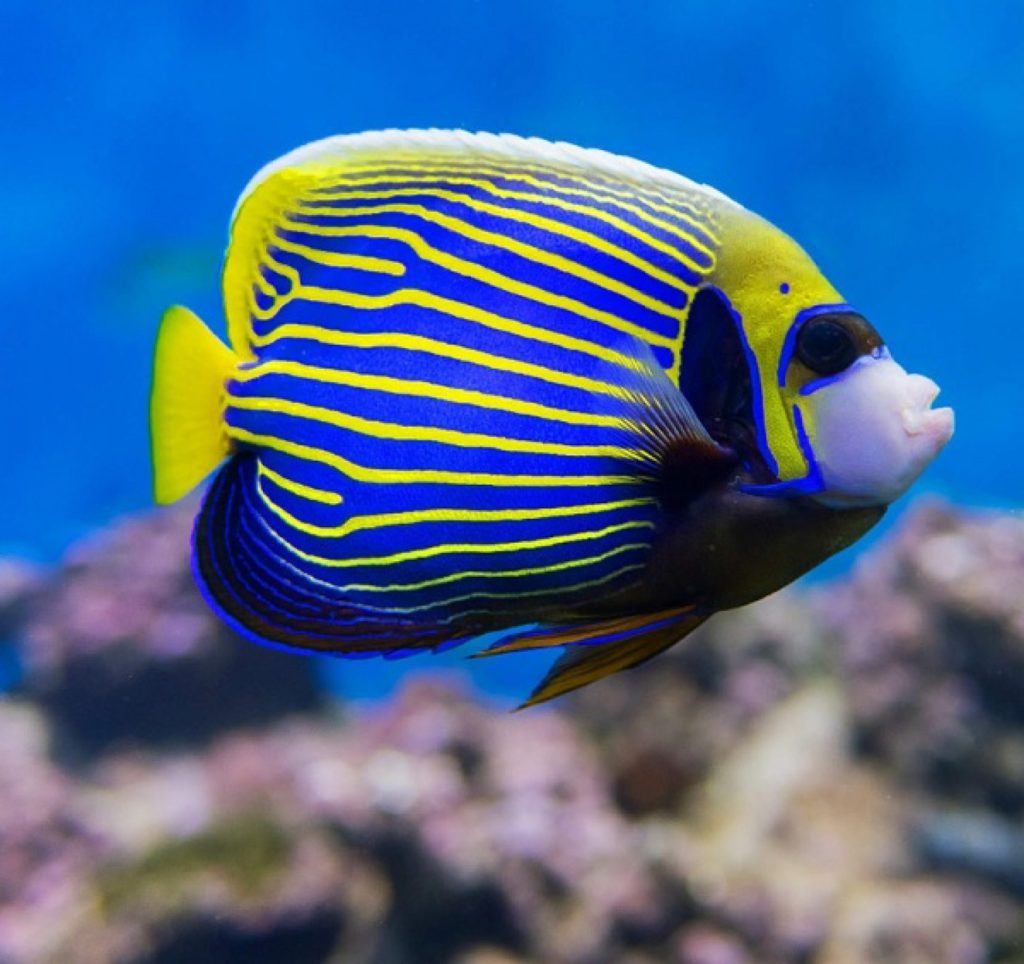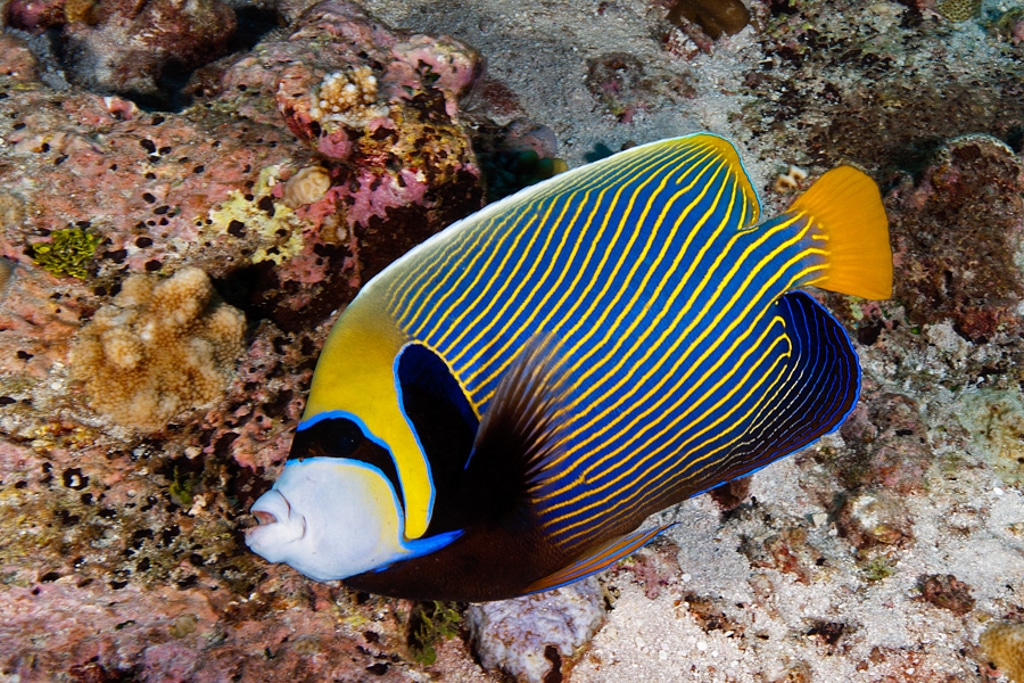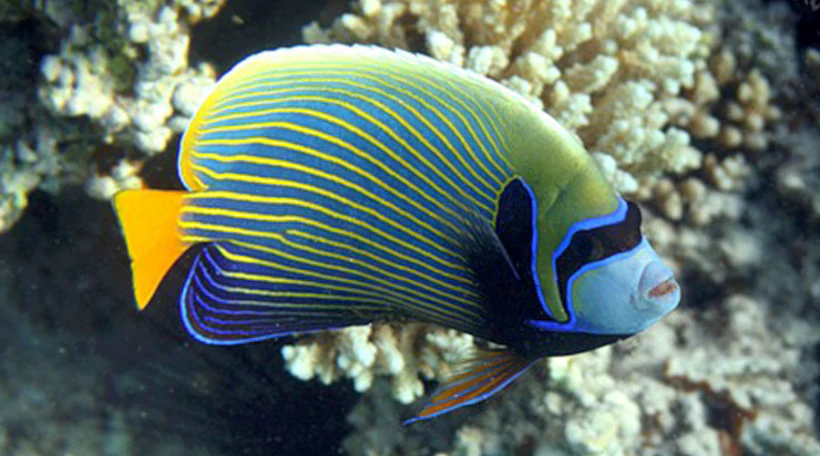The Imperial Angel (Pomacanthus imperator)- one of the most beautiful fish on the planet. Its luxurious coloring, graceful movements and elegant appearance make it a real "pearl" of coral reefs. This fish is not only aesthetically attractive, but also has complex behavior, unique adaptations to life in reef ecosystems, and interesting developmental features.
In this article, we will look at biological features of the imperial angel, its habitat, food habits, social behavior, main threats and role in nature.

1. Classification and general characteristics
🔹 Scientific classification:
✔ The Kingdom: Animals (Animalia)
✔ Type: Chordal (Chordata)
✔ Class: Lucheperi pisces (Actinopterygii)
✔ Row: Perch-like (Perciformes)
✔ Family: Angelfish (Pomacanthidae)
✔ Gender: Pomacanthus
✔ View: Imperial Angel (Pomacanthus imperator)
🔹 Appearance:
✔ Size: Adult length can reach up to 40 cm.
✔ Life span: Live in nature up to 15 years old, in captivity – slightly less.
✔ Color scheme:
* Young individuals have concentric blue-white circles.
* Adults change color to yellow-blue with a dark stripe across the eye.
✔ Feature: Discoloration occurs gradually over 24 months.
🔹 Interesting: Due to its striking appearance, the Imperial angel is one of the most popular aquarium fish, although its care is very difficult.
2. habitat
The Emperor's angels live in the warm waters of the Indian and Pacific oceans.
🌊 Main regions of residence:
✔ Red Sea.
✔ East African coast.
✔ Maldives.
✔ The Great Barrier Reef.
✔ Waters of Indonesia, the Philippines, and Japan.
🔹 Optimal conditions:
✔ Water temperature: 24–28°C.
✔ Depth: from 1 to 100 meters, most often – 5-20 m.
✔ The water should be rich in oxygen.
🔹 Interesting: Imperial Angels lead sedentary lifestyle, inhabiting a permanent territory. They rarely leave their favorite riffs.
3. eating habits
🍽 What does the Imperial angel eat?
✔ Sponges - basic diet.
✔ Bryozoans (Bryozoa).
✔ Coral waters - sometimes damage coral reefs.
✔ Algae and small invertebrates.
Imperial Angels – picky foodiesthis makes keeping them in aquariums difficult, as they need special nutrition.
🔹 Interesting: Thanks to their food specialization, the Emperor's angels help to control sponge populations in reefs, preventing them from overgrowing.

4. social behavior
Imperial Angels – territorial fishliving singly or in small harem groups (one male and several females).
🐠 Structure of a social organization:
✔ Lone Fish "adult males defend their territory.
✔ Harems - a group of one male and several females.
✔ Young people - less territorial, sometimes forming small flocks.
🔹 Interesting: If the dominant male dies, one of the largest females can change sex and take his place!
5. reproduction and life cycle
🔹 How does reproduction occur?
During the mating season, males show active behavior – bright movements, chasing after females.
✔ Fertilization external: caviar is discarded in open water.
Larvae develop in plankton and gradually settle to the bottom.
🔹 Interesting: Young individuals look very different from adults! They have a dark blue body with white and blue concentric rings that help them disguise themselves.
6. threats and species conservation
🚨 Main threats:
✔ Destruction of coral reefs because of global warming and human activity.
✔ Overfishing for the aquarium trade.
✔ Ocean pollution.
🌍 View status:
The Imperial Angel it is not under threat of extinction, but its population is declining due to environmental problems.
🔹 Interesting: To protect the species, some countries, such as Australia, have restricted the capture of Imperial angels for commercial purposes.

7. keeping in aquariums
The Imperial Angel – not for beginners. He needs special conditions:
✔ Aquarium capacity: minimum of 500 liters.
✔ Water temperature: 24-28°C.
✔ Salinity: 1.020–1.025.
✔ Live feed - sponges, seaweed, bryozoans.
✔ Caches in the form of reefs - for natural behavior.
🔹 Interesting: Even in the best conditions in captivity, the imperial angel lives less than in nature.
Conclusion
The Emperor Angel is the real king of coral reefs! It is not only admirable for its beauty, but also plays an important role in maintaining the balance of the ecosystem.
Its food habits, social behavior and complex life cycle make this fish one of the most interesting marine life in the world. However, due to human activity and climate change, its population is gradually declining.
Preserving coral reefs is not only about protecting unique fish, but also preserving the future of all ocean life! 🌊🐠